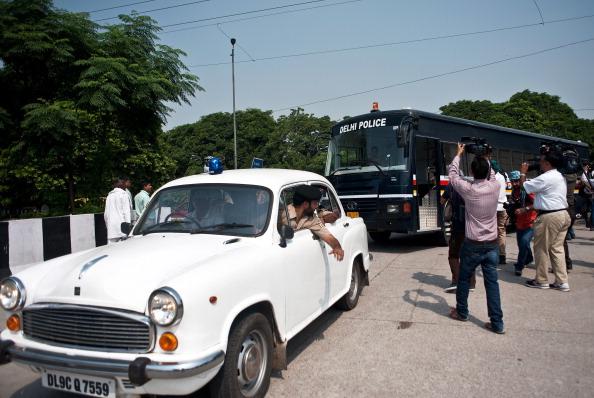A fast-track Indian court in Delhi is currently mulling over the sentence for four convicted on Tuesday of raping and murdering a 23-year-old para-medical student in the nation’s capital last year.
The sentence could be at minimum a life-sentence, and at maximum the death penalty.
Earlier on Tuesday, according to Indian broadcaster CNN-IBN, the Delhi court held four men—Akshay Thakur, Vinay Sharma, Mukesh Singh, and Pawan Gupta—guilty of the gang-rape and brutal murder of the young girl popularly known as “Braveheart.”
“It stands proved that the prosecutrix died due to injuries inflicted by the accused while committing various offences on the victims, inside the moving bus. There was a clear intention to cause death. As they were thrown out of the bus definitely shows that it has been done with the intention of certainly resulting in death,” the verdict stated, cited by CNN-IBN.
Through the verdict the court upheld the police case that the four, along with now-dead Ram Singh and a juvenile, were responsible for the heinous crime.
Singh killed himself in his prison cell in March this year, while the juvenile last month was sentenced to three years under reformation by a juvenile justice court—the highest sentence that could be given to a juvenile under Indian laws.
Immediately after the four men were convicted, a public debate around Indian cities with access to media started on what the sentence should be. Suhan Nanaiah, 39, from Mysore, Karnataka, said in an interview with Epoch Times: “I believe that they must be hanged to death as this will help to instill public fear that the law can be so strict. Otherwise, if they are sentenced to prison, the matter will be forgotten. Also imprisonment is really not an answer to such a brutal crime.”
While the case went through 130 hearings in the last nine months, the young woman’s parents and two brothers received tremendous support from people around the country and the world. “The way these men assaulted her, I can’t tell you,” her mother, weeping bitterly, said in a interview with NDTV. “But the world knows. The world stood behind us and fought with us. These men should be hung ’til death because they don’t deserve to live in our society.”
The brutal assault led to wider public outrage and protests around the country and led the Indian government to initiate various measures for protection of women around the country, particularly in the national capital. However, many remain skeptical, and a call on the country to treat its women better still resounds throughout India.
Devayani Odath, 57, from Kochi, Kerala, said: “The society will not necessarily change its ways due to capital punishments being handed down to the criminals. There needs to be a fundamental change in India toward the way women are treated. It should start from the family, where in most cases, the boy child is given more importance than the girl.”
Daksha Devnani and Naveen Athrappully have contributed to this report.





